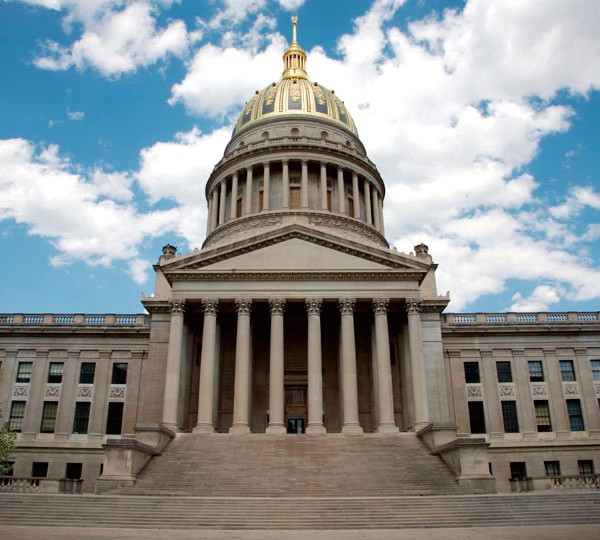MORGANTOWN — The Senate Judiciary Committee debated for a bit over an hour on Monday a resolution to ask Congress to call a convention to propose a constitutional amendment setting congressional term limits.
The arguments were familiar – convention resolutions come up year after year – and the conclusion was foregone, but after it was over, committee chair Charles Trump, R-Morgan, praised the members for their thorough debate and upstanding conduct. “I think the debate was great. It was cordial. It was civil. And I’m going to leave today proud to be a member of this committee.”
Article V of the U.S. Constitution allows for what some call the nuclear option for amending the Constitution if Congress won’t propose amendments itself via votes of two thirds of each house.
That option lets two-thirds of the states (34 now) to apply to Congress to call a convention to propose amendments. Any amendments that come out of that convention must be approved by either three-fourths of the state legislatures (38 now) or by conventions in three-fourths of the states.
The resolution before the committee, SCR 4, applies to call a convention – when the appropriate two-thirds threshold is reached – for the sole purpose of term limits. It specifies that this question would not be aggregated with any other applications on any other subject.
Sen. Mike Romano, D-Harrison, has been the lead opponent on various Article V resolutions. He killed one like this last session, HCR 61, with a filibuster that filled the last 20 minutes of the last day.
He said, “This subject has come up so many times since I’ve been here it just almost seems like old hat.”
He spoke several times during the meeting but his argument can be summed up that Article V spells out no rules and sets no boundaries for the convention. It doesn’t say who the delegates would be or how it would be run.
Most important for Romano, it doesn’t limit the convention topics to whatever issue the states applied about. He cited several times the 1787 convention to amend the Articles of Confederation that led to an entire rewrite and creation of the current Constitution.
If members of the political extremes controlled the convention, he said – left or right – they could undo the First Amendment or Second Amendment or draft a Constitution to totally remake the government.
“Are term limits so important to risk an out-of-control convention,” he asked. “For term limits we’re going to be putting our Constitution at risk.”
Romano named some great U.S. Supreme Court legal scholars – Antonin Scalia, Warren Burger, Arhtur Goldberg – and others who all cautioned about runaway conventions. Article V exists to to make minute changes, but to put a check on federal tranny, he said, and it’s never been used in 233 years. In this case, voting is the ultimate terms limit. “We’re playing with fire here.”
Romano proposed an amendment to the resolution that would have rewritten it to rescind all Article V resolutions that previously passed both houses and went to Congress. That amendment failed.
Sen. Richard Lindsay, D-Kanawha, also opposed the resolution. “There are a lot of unsettled issues.” Among them, it would be the delegates who write the convention rules, not Congress or the states.
Four resolution sponsors spoke in favor of it. Lead sponsor Randy Smith, R-Tucker, said, “We’ve heard a lot of boogeyman stories concerning this.” But 81% of West Virginia voters support term limits.
One reason there’s never been a convention, he said, is that when an issue gets close to the 34-state threshold, Congress drafts and passes an amendment to send to the states for ratification.
But sometimes Congress has to be reined in, he said. “I honestly believe right now we have an out-of-control government. We have to get this convention.”
Sen. Mike Azinger, R-Wood, is comforted rather than concerned about Article V’s vagueness. “The founders chose not to tell us how to do it also … in terms of the minutiae. … Maybe because the founding fathers understood that a free and moral people can come up with their own rules without a bureaucracy or somebody telling them how to do it.”
Sen. Patricia Ruucker, R-Jefferson and a naturalized citizen who came to the U.S. from Venezuela, said, “I love our Constitution. I think it’s one of the best things that’s ever come out in the history of the world.”
The founders created Article V, she said, for when Congress would be hesitant to restrain itself. And Congress isn’t inclinced to restrain itself on balanced budgets or term limits.
Sen. Paul Hardesty, D-Logan, is one of two Democrat resolution sponsors (among 15 total). Calls form his constituents are about 50-50 on term limits. But he favors them, given the increasing polarization that’s trickling down to Charleston, he said.
There’s no guarantee the convention won’t get out of hand, he said. But “we’ve got to try to restore the public trust. Career politicians in Washington, D.C., are the reason we’re approaching $20 trillion in debt.”
The voice vote to approve the resolution was divided and sounded close. But When Trump called the winning side no one from the losing side called for a show of hands. SCR 4 now goes to the full Senate, then to the House.
Tweet David Beard @dbeardtdp Email dbeard@dominionpost.com




